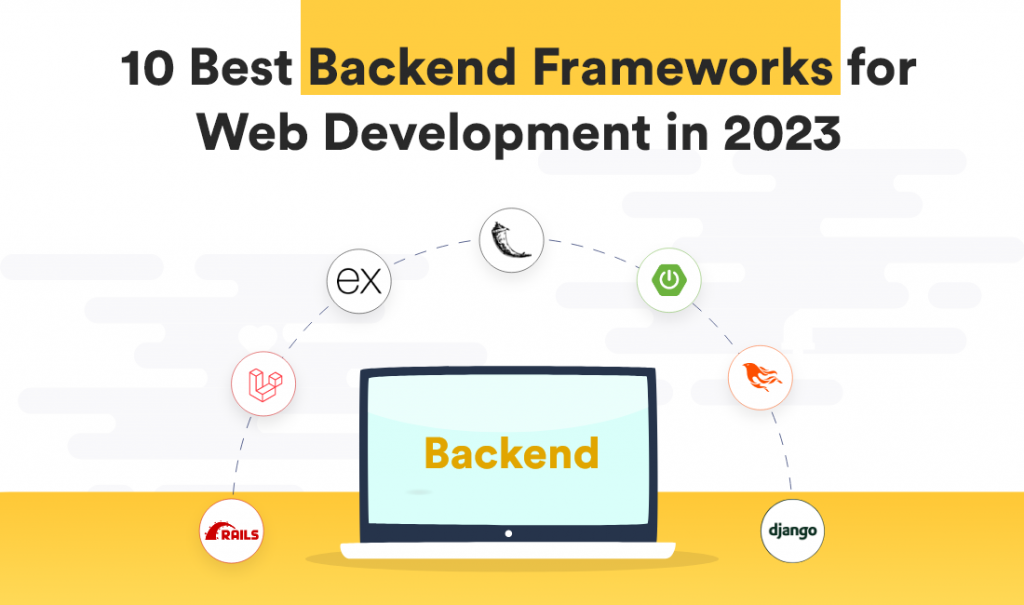Without a doubt, organizations require best backend frameworks development to create a successful online app, which is essential to their overall success. The frontend development work is appropriately integrated and delivered while taking into account the goals and vision of each project as it manages the business logic. Some of the most important programming tools available to developers today are back-end web frameworks.
This article highlights the 10 best backend frameworks that can keep organizations competitive in addition to defining what a backend web framework is and how it may facilitate and speed up the programming process.
Just like there are best frontend framework for frontend development there is also best backend frameworks for the development of your backend. Now that you have a fundamental understanding of what a web backend framework is and how it can benefit your company and your engineers, let’s start with the top backend frameworks that can assist you in 2023.

Both its ease of use and full stack capabilities make the Ruby on Rails framework a household name. The framework’s main goal is to eliminate a lot of the tedious effort from the process of developing web apps, making it easier than ever before.
The infrastructure is provided by the framework, allowing you to concentrate on the important part of your app’s code. Although not a commonly used programming language, it is a well-liked backend framework since it makes programming easier and provides ruby gems, libraries and automated testing for developers.
Laravel is one of the best backend frameworks you can choose if you’ve been looking online for a PHP backend framework. This backend framework is made especially for websites that use Symphony. When it comes to developing your backend, Laravel is the most excellent option.
In addition to being complicated when it comes to handling a specific or small project, Laravel might be better suited for beginners. It is best suited for seasoned developers who want to work on challenging tasks.
Regarded as one of the top platforms for building web applications express is a backend Node.js framework for creating APIs and web apps. It is a part of the MEAN stack’s backend, with databases and other technologies.
Instead of a user’s browser, the web server is operated by the WSGI framework Flask. Many contemporary applications utilize Flask because it enables them to design projects tailored to their needs that work quickly. It supports feature-adding add-ons that make them seem like they were integrated into Flask directly. Flask is simple to use for any developer who is acquainted with a Python based framework. It is the best back-end web framework if you need to focus on server-side web programming.
A Java-based framework called Spring Boot was introduced in 2014 and is open-source and compact. It is applied to the development of standalone apps. It includes a spring core container, a tool that offers containers. It is one of the most well-liked frameworks, employs CRUD operations, and sticks to the MVC design. Extensions are available for building web apps, offering customizable security measures. Developers use lazy initialization to make beans that are based on the language.
PHP simplifies web development by offering a scaffold that can be used as a springboard when developing web apps. The scaffold (code) can be used as a jumping off place for creating a web app. It is accessible under a License agreement and uses the MVC design.
Phoenix is an advanced online app platform and open-source framework created in Erlang and Elixir. It employs the Erlang VM and the Ruby-like Elixir programming language to develop dependable, fault-tolerant apps. The framework additionally enables WebSocket and agnostic channels for real-time client communication. Additionally, it uses the Cowboy server’s functionality and asks for it.
The model-view-controller architectural structure is used by the open-source Python web framework Django. It concentrates on creating intricate websites that are driven by databases. Django is the best option if having a high-performance website is your top concern.
Microsoft’s programming framework is called ASP.NET Core. It replaces ASP.NET, which creates online apps on the.NET framework. This modular system is cross-platform,.NET system, and Windows compatible.
ASP.NET Core offers a variety of life-cycle assistance that is tailored to your app’s needs. Popular businesses like Alibaba Travels, Cognizant, Via Varejo, LiteTube, and others use it.
.NET Core is a different web development framework managed by Microsoft and comes last on our list of backend frameworks. It is a platform-agnostic framework used to create server-side apps.
It replaces .NET and is regarded as one of the top software development frameworks. Samsung, Microsoft, Intell, and Cisco are just a few businesses that use them. NET.
Choosing a decent backend framework might be crucial when building a strong, secure, and scalable app or website. Any large-scale backend development project requires the use of backend frameworks. Consider learning a backend framework in addition to a backend programming language if you want to do so. These can be described as the popular and best backend frameworks. If you want to learn more relevant updates, visit DevTechToday and sign up for more updates.